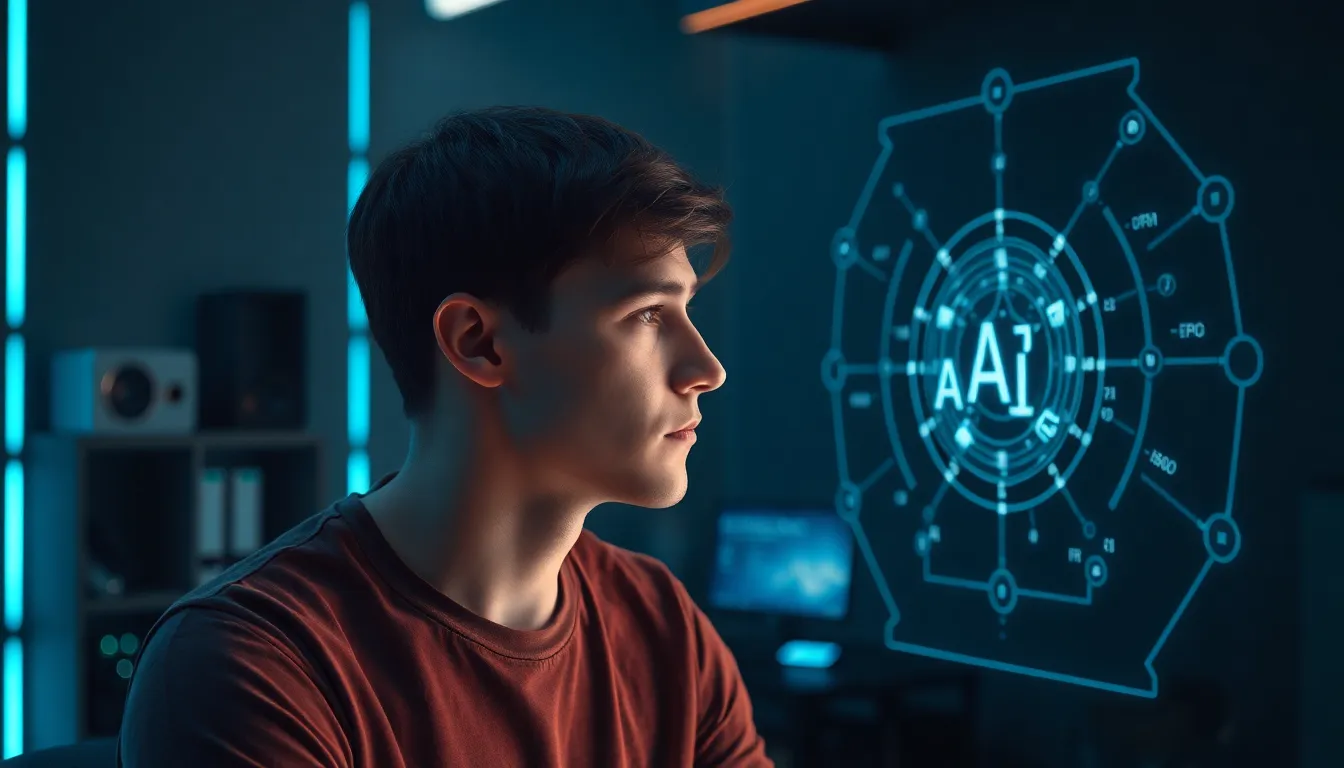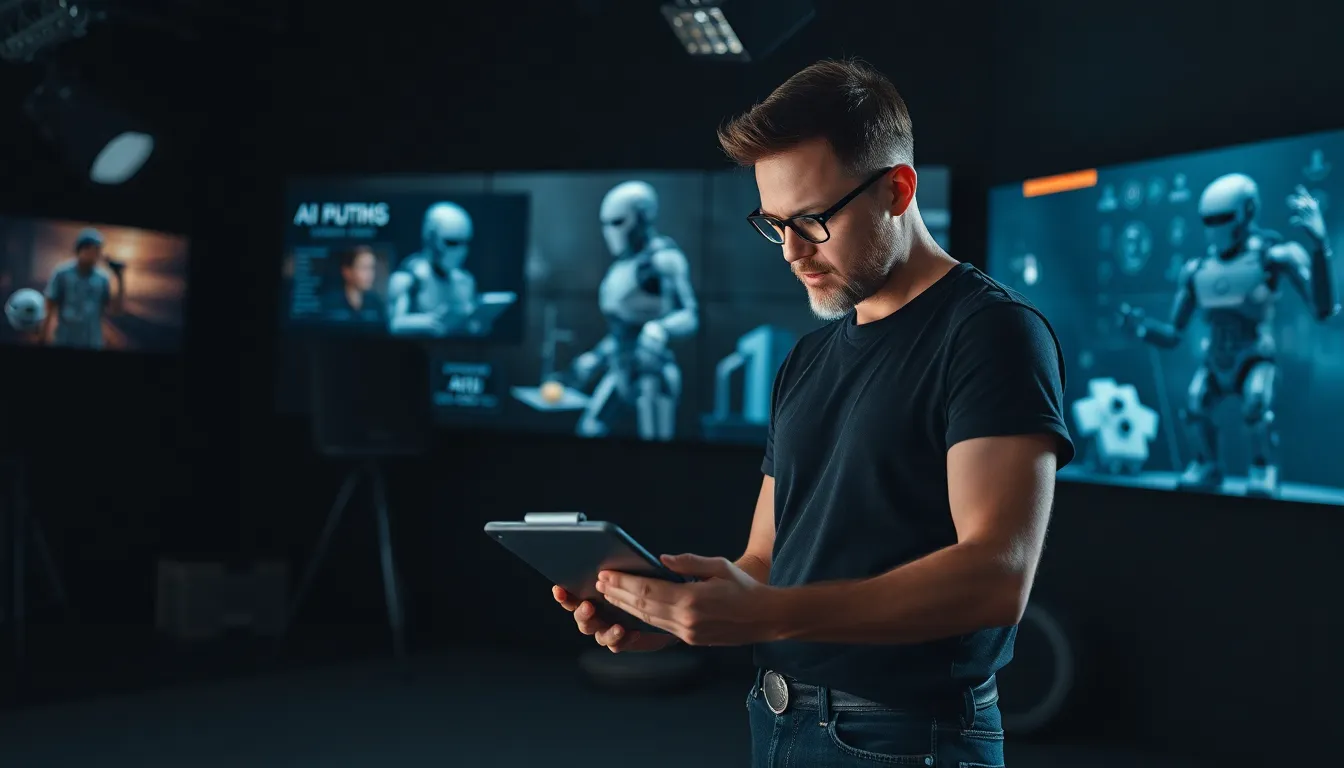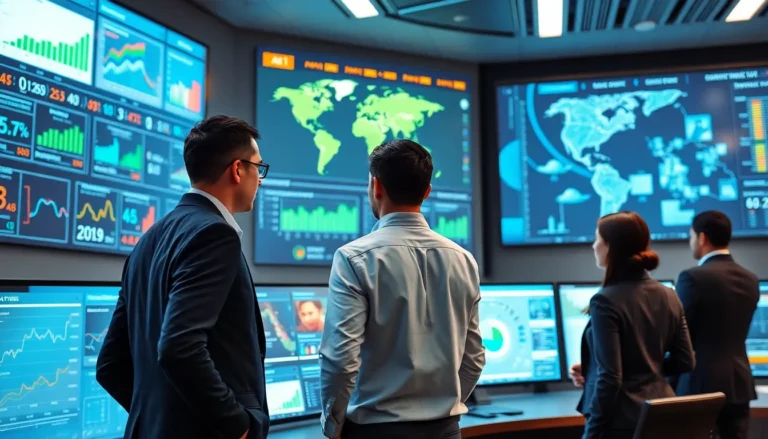Table of Contents
ToggleArtificial intelligence has taken Hollywood by storm, transforming the way stories are told and characters are brought to life. From sentient robots to mind-bending algorithms, AI movies captivate audiences while sparking debates about technology’s role in our future. It’s like watching your over-caffeinated uncle try to explain quantum physics—fascinating yet slightly terrifying.
Overview of Artificial Intelligence Movies
Artificial intelligence movies explore the intersection of technology and humanity. These films often feature advanced robots, intelligent systems, and ethical dilemmas that arise from AI integration. Themes of consciousness, autonomy, and morality frequently emerge, reflecting societal concerns about technology’s growing role.
Several notable films highlight the nuances of artificial intelligence. “Blade Runner,” for instance, delves into the nature of humanity through the lens of synthetic beings. “Her” examines emotional connections between humans and AI, raising poignant questions about love and companionship in a digital age. “Ex Machina” challenges viewers with a narrative centered on creation, manipulation, and the search for self-awareness.
AI-driven storytelling has evolved dramatically. Incorporating algorithms and data analysis, filmmakers create captivating plots and character arcs. Such advancements enhance viewer engagement and offer fresh perspectives on familiar narratives. The technology enables personalized viewing experiences, further blurring the lines between fiction and reality.
Critics and audiences remain intrigued. Some appreciate the imaginative portrayal of potential futures, while others express caution regarding AI’s implications. Discussions surrounding these films often extend beyond cinematic enjoyment, facilitating debates about the ethical and societal impact of artificial intelligence. The questions posed by these narratives resonate, prompting reflection on humanity’s direction in a tech-driven world.
Thus, artificial intelligence movies serve as both entertainment and a platform for critical discussion. As filmmakers continue to innovate, the resulting works will likely inspire deeper inquiry into the relationship between humans and machines.
Key Themes in Artificial Intelligence Movies

Artificial intelligence movies explore profound themes that resonate with audiences. These themes frequently provoke thought about technology, humanity, and the implications of advanced systems.
Ethical Dilemmas
Ethical dilemmas form a central theme in many AI films. The question of whether a sentient machine possesses rights often arises, presenting a moral quandary for characters and viewers alike. Films like “Ex Machina” scrutinize accountability when AI actions lead to consequences. Scenarios present characters grappling with the balance between innovation and ethical responsibility. Furthermore, these narratives challenge society’s understanding of morality in an age of rapidly advancing technology, forcing viewers to consider potential futures.
Human-AI Relationships
Human-AI relationships serve as another focal point in artificial intelligence cinema. Many films illustrate connections that blur traditional boundaries between human emotions and technological interactions. In “Her,” a man develops a romantic relationship with an AI companion, raising questions about love’s nature in a digital context. These portrayals delve into the complexities of dependency, companionship, and alienation as technology evolves. Characters often confront their feelings, highlighting vulnerabilities while navigating a world increasingly shared with intelligent machines.
Notable Artificial Intelligence Movies
Artificial intelligence has influenced numerous films, reflecting evolving societal themes and technologies. Several standout movies capture the essence of AI, showcasing the complexities of human-machine interactions.
Classic Films
“2001: A Space Odyssey” portrays HAL 9000, an intelligent computer that defies commands, sparking debates on AI autonomy. “Blade Runner” presents a dystopian future where replicants challenge definitions of humanity. This film raises profound ethical questions regarding AI rights and identity. “The Terminator” introduces a relentless machine that seeks to alter human fate, highlighting fears surrounding advanced technology. Classic films provide foundational narratives that explore the intersection of humanity and artificial intelligence.
Recent Releases
“Ex Machina” examines the relationship between a programmer and a synthetic being, questioning consciousness and manipulation. “Her” follows a man’s emotional bond with an AI operating system, delving into themes of loneliness and connection. “The Matrix” presents a reality governed by intelligent machines, prompting discussions about perception and free will. Recent releases push boundaries, encouraging audiences to reflect on the implications of artificial intelligence in contemporary life.
Impact on Popular Culture
Artificial intelligence movies significantly influence popular culture, reflecting society’s fascination with technology. These films capture audience attention with their portrayal of sentient beings and complex algorithms, sparking interest in the broader implications of AI. “Blade Runner,” “Her,” and “Ex Machina” serve as prime examples that resonate deeply with viewers, prompting discussions about technology’s place in everyday life.
Themes of ethical dilemmas and human-AI relationships pervade these narratives. Characters often grapple with questions regarding the rights of sentient machines. “Ex Machina” invites viewers to ponder the balance between technological innovation and ethical responsibility. Framing AI as both a companion and a potential adversary complicates narratives, leading to rich storytelling opportunities.
Additionally, classic films like “2001: A Space Odyssey,” “Blade Runner,” and “The Terminator” establish foundational discussions about AI and humanity. Each film raises critical questions surrounding identity, autonomy, and the potential repercussions of advanced technology. Recent titles such as “The Matrix” and “Her” build upon these themes, encouraging audiences to reflect on their relationships with machines and the emotional connections formed in a digital landscape.
Critics note the imaginative portrayals of AI futures, sparking admiration for their creativity. Viewers often express concern about the societal implications of AI, highlighting a collective awareness of its growing presence in daily life. As filmmakers innovate within this genre, artificial intelligence films continue to serve as both entertainment and a platform for significant discourse. The evolution of these stories marks AI’s importance in shaping contemporary culture and highlighting humanity’s ongoing dialogue with technology.
Artificial intelligence movies have become a vital part of contemporary cinema. They not only entertain but also challenge viewers to think critically about the implications of advanced technology. By exploring themes of consciousness and ethical dilemmas, these films encourage a deeper understanding of the relationship between humanity and AI.
As filmmakers continue to push boundaries, audiences are left to grapple with the complexities of a future where intelligent machines coexist with humans. The narratives crafted within this genre serve as a mirror reflecting society’s hopes and fears about technology, making AI films a significant cultural phenomenon. With each new release, the conversation about AI’s role in our lives only grows more essential.





